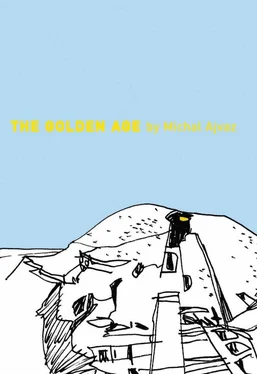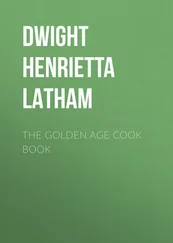Michal Ajvaz - The Golden Age
Здесь есть возможность читать онлайн «Michal Ajvaz - The Golden Age» весь текст электронной книги совершенно бесплатно (целиком полную версию без сокращений). В некоторых случаях можно слушать аудио, скачать через торрент в формате fb2 и присутствует краткое содержание. Год выпуска: 2010, Издательство: Dalkey Archive Press, Жанр: Современная проза, на английском языке. Описание произведения, (предисловие) а так же отзывы посетителей доступны на портале библиотеки ЛибКат.
- Название:The Golden Age
- Автор:
- Издательство:Dalkey Archive Press
- Жанр:
- Год:2010
- ISBN:нет данных
- Рейтинг книги:4 / 5. Голосов: 1
-
Избранное:Добавить в избранное
- Отзывы:
-
Ваша оценка:
- 80
- 1
- 2
- 3
- 4
- 5
The Golden Age: краткое содержание, описание и аннотация
Предлагаем к чтению аннотацию, описание, краткое содержание или предисловие (зависит от того, что написал сам автор книги «The Golden Age»). Если вы не нашли необходимую информацию о книге — напишите в комментариях, мы постараемся отыскать её.
is Michal Ajvaz’s greatest and most ambitious work.
The Golden Age
The Golden Age — читать онлайн бесплатно полную книгу (весь текст) целиком
Ниже представлен текст книги, разбитый по страницам. Система сохранения места последней прочитанной страницы, позволяет с удобством читать онлайн бесплатно книгу «The Golden Age», без необходимости каждый раз заново искать на чём Вы остановились. Поставьте закладку, и сможете в любой момент перейти на страницу, на которой закончили чтение.
Интервал:
Закладка:
As the narrative progressed it seemed that the original puo stain was about to be transformed into a ziud stain. But the reader of experience smelled a red herring: the signs foretelling a transformation to ziud were too obvious, too stage-managed. Though they were hidden, this was done in such a way that the attentive reader could spot them. He began to understand that signs suggesting a transformation to ziud were scattered across the work to draw the reader’s attention away from the real — albeit hidden — focal point of the plot, and that this must be the suspiciously unobtrusive small stain near the nest protrusion. He became ever more certain that the moment was approaching when the small stain would enter the action; it might suddenly expand before swallowing the large stain so that the two of them formed a mue stain.
But in the end the reader was surprised to learn that his bluff had been called. His shrewdness and worldly wisdom had been shown up as naivety. The author had reckoned with his suspicions and exploited these with craft. The reader had overlooked the fact that there were two red herrings; his uncovering of the first deceit had prevented him from seeing the second, from deducing that two untruths made a truth. The small stain did not enter the action at all; its ostensible meaninglessness was a disguise for emptiness. There came a point in the action where the small stain unravelled and then disappeared. When the baffled reader returned to the large stain — having paid so little heed to the unobtrusive changes taking place on its left side, as he was preoccupied with tracking down a ruse on the part of the author — he realized that the original stain had gradually assumed the form of the ziud , the very outcome he had least reckoned with.
Of course, in describing these beautiful stories separately, I am not showing them to their full advantage; to give you a proper idea of their nature I would have to relate whole stain eposes and symphonies replete with heroes, crisscrossed networks and unexpected twists. But I think it likely you would not find this amusing. Indeed, I doubt you much enjoyed the tale of the puo stain. If you skipped a few lines or even the whole passage, you have nothing to be ashamed of: it took me a long time to get used to this literary genre.
If I were to retell some of the stain novels contained in the Book , I would struggle with the translation. This is another of the things I was thinking about at the station. As you know, the islanders have names for the different stains that have no equivalents in Czech, so these would have to remain in the original with the attachment of long explanatory footnotes, in which I would describe the shapes of the stains, the relationships among them, their durability and changeability, their tendency to different kinds of transformation and the effects of these transformations on other stains, both close and distant. To explain the name of a stain I would need to refer to the names of all the others; in the end we would have a network of explanatory footnotes in which each note referred to all the others, and this network would draw in the main text, which would become a commentary on its own commentary, a series of footnotes for footnotes.
So in the end I decided to retell a relatively closed episode from a part of the Book in which an unknown author describes over a great many pages (spangled with dozens of white insertion pockets like a meadow flush with mushrooms) the feud between two royal houses living in a mythical archipelago. This feud survived several generations — the crimes of fathers provoked acts of vengeance from sons which were also crimes which would have to be paid back. Interludes of peace allowed the heart to nurture memories of how it had been wronged, with the result that the unquiet hand groped for the dagger and new wrongs were wrought.
The queen’s illness
The story of the feuding families was written on a strip of paper folded into one of the Book ’s pockets; this pocket was inserted into a story about the adventures of an island prince, a character reminding one of Odysseus and Sinbad. One night a wicked jinni steals into the bedroom of his beloved wife and spirits her away. The prince spends twenty years at sea in a fast boat called the Dark Desperation , searching sinister islands and ill-boding coastlines. The end of this long section is rather strange even by the standards of the Book . After twenty years of roaming the prince finds his wife on a distant island of rock. She has been living here for many years alone in an empty palace by the shore: the jinni lives with each of his women for one year only, and he left her long ago.
In the beginning the woman is desperate with longing for her husband and her homeland. But over the years spent in seclusion on the island, she develops a love of solitude; she spends hour upon hour watching the ever-changing surface of the sea until she believes that she understands its script. These are the most beautiful letters in the world, and she never wearies of reading their wonderful messages. And so she spends her days on the shore in a state of rapture. The sudden appearance of her husband is unpleasant to her, as are the constant, noisy perambulations of his retainers on the paths and in the gardens of the palace. She is torn from her contemplations, dislocated from her dialogue with the ocean. She sulkily prepares her departure. But when the Dark Desperation is about to sail, she tells the prince she will be staying on the island. And the prince does not attempt to talk his wife out of her decision: for the several days of his stay on the jinni’s island he has found her indifference and eccentricity hard to bear. He realizes that he is glad to be leaving the island without her. Thus ends a twenty-year pilgrimage.
As the wife stands on the shore watching the boat disappear over the horizon, it seems that the prince is quitting the pages of the Book for good. After several days of unpleasantness, confusion and discomfort she is happy to return to her reading of the great manuscript of the sea. She whispers a declaration of love and a promise of fidelity to the sea; this Lautréamontesque ode to the ocean tells of the beauty of her lonely, husbandless, childless, friendless death on the moist sands amid the murmur of the waves. (Perhaps there is a direct influence at work here, but I am at a loss to identify it. It is not inconceivable that Isidore Ducasse stopped off on the island as he voyaged between Uruguay and France.) To the anti-social, solitary islanders this ending is far less scandalous than it would be to us.
But the story of the feuding families is set sometime earlier than the curious ending of the quest for the lost wife; the prince is still dreaming of reunion with his beloved, still scouring every coastline he can find. Most of the islands where he drops anchor are populated by monsters, cannibals or walking machines in metal coats which glow in the sun. Only once does he come across an amicable people with a welcoming, shaded palace. As he rests here a while the prince tells the island’s ruler and his family — in the manner of Odysseus in the palace of the Phaiakians or Aeneas in Carthage — of his homeland and his travels. The prince is descended from one of the warring families, so his story includes an account of the feud. The Book states: “For three days and three nights he recounted to the king and the queen the long, sad tale of the warring families.” Those readers who chose to let this sentence be and not to open the thick pocket which was inserted here, learned nothing about the feud; they spent two weeks on the hospitable island in the company of the hero, learned of his further adventures and then of their bewildering end. But those who did choose to open the pocket, as I did, were given the history of the feuding families of the archipelago. It includes an episode I would like, dear reader, to retell.
Читать дальшеИнтервал:
Закладка:
Похожие книги на «The Golden Age»
Представляем Вашему вниманию похожие книги на «The Golden Age» списком для выбора. Мы отобрали схожую по названию и смыслу литературу в надежде предоставить читателям больше вариантов отыскать новые, интересные, ещё непрочитанные произведения.
Обсуждение, отзывы о книге «The Golden Age» и просто собственные мнения читателей. Оставьте ваши комментарии, напишите, что Вы думаете о произведении, его смысле или главных героях. Укажите что конкретно понравилось, а что нет, и почему Вы так считаете.












